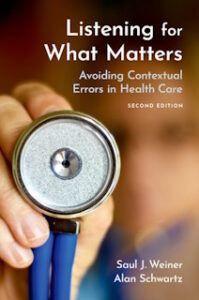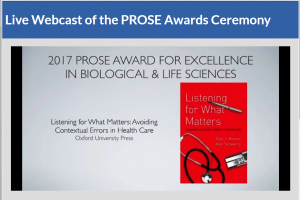Welcome
Welcome to the Contextualizing Care blog.
Most of us have consulted a physician at some point; many of us wonder whether our physicians’ recommendations could have been better tailored to our circumstances and needs. As medical educators and health care researchers, we have made improving the contextualization of care an important focus of our career.
 We know that doctors want to treat patients as individuals, and to provide the best care for each patient. But we also know that the systems and structure of medical practice, payment, and training work against individualized care. Through our research studies, we have demonstrated that the failure to contextualize care is common, costly, and leads to worse health for patients. Through our book, Listening for What Matters, and this blog, we hope to share these insights and to explain our vision of how medical care and medical education can reclaim the focus on individual patient context. We hope we will spark a discussion among patients, physicians, payers, and policymakers about what it means to practice patient-centered medicine.
We know that doctors want to treat patients as individuals, and to provide the best care for each patient. But we also know that the systems and structure of medical practice, payment, and training work against individualized care. Through our research studies, we have demonstrated that the failure to contextualize care is common, costly, and leads to worse health for patients. Through our book, Listening for What Matters, and this blog, we hope to share these insights and to explain our vision of how medical care and medical education can reclaim the focus on individual patient context. We hope we will spark a discussion among patients, physicians, payers, and policymakers about what it means to practice patient-centered medicine.
Contextualizing Care: Fireside Chat Series
We are pleased to share a video series on contextualizing care, designed for both clinicians and researchers interested in the field. This “Fireside Chat” series is designed to provide an easy to understand and enjoyable (hopefully) way to explain this work. Each combines a conversational style with slides,
graphics, and figures.
The core topics are:
- What is Patient (life) Context?: An Introduction to Contextualizing Care
- Contextualizing Care: A 4-Step Process
- Contextual Error: The Research Evidence
- Preventing Contextual Error: The Research Evidence
Anyone who watches these first four videos (which will take about an hour) should have a strong understanding of the topic, both from a clinical and a research perspective.
The fifth video (Content Coding for Contextualization of Care – 4C) is designed for researchers and quality improvement professionals interested in acquiring audio coding skills essential for studying or measuring contextualization of care.
The sixth video is a special topic: patient context and SDOH. Many have asked how contextualizing care is similar to and different from studying social determinants of health. This video explains.
Preventing Contextual Errors Program in VA Diffusion Marketplace
The VA Health Care System has added information about the implementation of our work to improve contextualization of care in the VA to its Diffusion Marketplace web site for health care innovations. You can visit it at https://marketplace.va.gov/innovations/preventing-contextual-errors-pce-program
Coffee & Science interview with Saul Weiner
Institute for Health Improvement President and CEO Dr. Kedar Mate interviewed Saul about contextualizing care for the UCSF SIREN Coffee & Science Podcast.
Listen below or at https://sirenetwork.ucsf.edu/podcast/promise-and-pitfalls-adjusting-care-context
https://share.transistor.fm/s/a27aa17cA video introduction to 4C coding
During a medical encounter, clinicians should attempt to identify and address, where feasible, patient life challenges that are complicating their care — a process called “contextualizing care.” Several studies have documented that when physicians contextualize care patients have better outcomes, there is less overuse and misuse of medical services, and hospitalization rates are reduced. Determining objectively whether a care plan has been contextualized requires analysis of audio recordings and medical record review, utilizing a process called “Content Coding for Contextualization of Care” (“4C”). This video provides an introduction to contextualizing care (Saul J. Weiner, MD) followed by a demonstration of 4C coding, utilizing REDCap (Amy Binns-Calvey). The 4C coding manual and REDCap XML file are free and accessible at http://dvn.iq.harvard.edu/dvn/dv/4C.
Remembering Dr. Simon Auster
Dr. Simon Auster, MD, JD’s countless insights and the example of his life and practice of medicine were the inspiration for much of our work on contextualization of care. Saul’s most recent book, On Becoming a Healer, is dedicated to Simon.
This reflection, authored by Saul and two colleagues, was published in his memory in the Autumn issue of the The Pharos, the Journal of the Alpha Omega Alpha Honor Medical Society, and is available here by permission from the publisher.
Cite as: Weiner SJ, Meyer E, Schoomaker E. In Memory of Dr. Simon Auster: A Teacher who Challenged and Honored Each Student. The Pharos. Journal of the Alpha Omega Alpha Honor Medical Society. Autumn 2020.
Saul Weiner at the 2020 ICCH Plenary
Saul Weiner gave the 2020 Plenary at the International Conference on Communication in Healthcare. You can watch his presentation below or at https://vimeo.com/474981486
Coming in 2020: On Becoming a Healer
Saul Weiner’s new book, On Becoming A Healer: The Journey from Patient Care to Caring about Your Patients is slated for release by Johns Hopkins University Press on April 7, 2020.
You can learn more about it, read the amazing reviews it’s already received from leaders in health care, and pre-order the book at https://jhupbooks.press.jhu.edu/title/becoming-healer.
Saul Weiner at VHA iEx 2019
Saul Weiner discusses the Contextualizing Care Program active at several U.S. Department of Veterans Affairs medical centers at the VHA iEx 2019 session on October 23, 2019.
Saul Weiner and Amy Binns-Calvey on “An Arm and a Leg”
Saul Weiner and Amy Binns-Calvey discussed the use of USP “secret shopper” patients in our VA study on the “An Arm and a Leg” podcast on July 24, 2019. You can listen to the show at https://armandalegshow.com/an-actor-walks-into-a-doctors-office/
Helping homeless Veterans
VA Research Currents has published an article about our work in enhancing contextualization of care in the VA through direct observation by unannounced standardized patients – and how we’re using them to help the VA better provide services to homeless Veterans. Read about it here: ‘Mystery shopper’ model being used to boost VA care.
LFWM wins 2017 PROSE Award for Life and Biological Sciences
Listening for What Matters has been named the winner of the 2017 PROSE Award for Excellence in Biological and Life Sciences, one of the five primary categories. The PROSE awards are given annually by the Association of American Publishers’ (AAP) Professional and Scholarly Publishing (PSP) Division for the best scholarly works of the preceding year in the primary categories and 53 subcategories; this year saw a record number of entries submitted by their publishers. Listening for What Matters also won the Nursing & Allied Health subcategory prize.

Stanford MedX (updated)
At 1:50pm Pacific time today, Saul will be speaking in the Plenary Hall at Stanford MedX about the importance of using unannounced standardized patients to directly observe care, one of the core missions of I3PI, Inc. We’ll post video of the talk if/when they make it available.
Update: Here are two clips from the talk:

